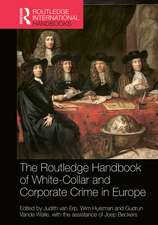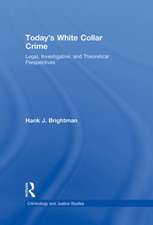The Origins of Modern Financial Crime: Historical foundations and current problems in Britain: Routledge SOLON Explorations in Crime and Criminal Justice Histories
Autor Sarah Wilsonen Limba Engleză Paperback – 24 apr 2016
The analysis in this text focuses primarily on how Victorian society perceived and responded to crime and its perpetrators, with its reactions to financial crime specifically couched within this. It is proposed that examining how financial misconduct became recognised as crime during Victorian times makes this an important contribution to nineteenth-century history. Beyond this, the analysis underlines that a historical perspective is essential for comprehending current issues raised by the ‘fight’ against financial crime, represented and analysed in law and criminology as matters of enormous intellectual and practical significance, even helping to illuminate the benefits and potential pitfalls which can be encountered in current moves for extending the reach of criminal liability for financial misconduct.
Sarah Wilson’s text on this highly topical issue will be essential reading for criminologists, legal scholars and historians alike. It will also be of great interest to the general reader.
The Origins of Modern Financial Crime was short-listed for the Wadsworth Prize 2015.
Din seria Routledge SOLON Explorations in Crime and Criminal Justice Histories
-
 Preț: 332.70 lei
Preț: 332.70 lei -
 Preț: 311.41 lei
Preț: 311.41 lei -
 Preț: 326.49 lei
Preț: 326.49 lei -
 Preț: 310.95 lei
Preț: 310.95 lei -
 Preț: 466.88 lei
Preț: 466.88 lei -
 Preț: 411.42 lei
Preț: 411.42 lei -
 Preț: 436.14 lei
Preț: 436.14 lei -
 Preț: 449.41 lei
Preț: 449.41 lei -
 Preț: 341.55 lei
Preț: 341.55 lei -
 Preț: 432.12 lei
Preț: 432.12 lei -
 Preț: 388.42 lei
Preț: 388.42 lei -
 Preț: 387.91 lei
Preț: 387.91 lei -
 Preț: 371.30 lei
Preț: 371.30 lei -
 Preț: 382.86 lei
Preț: 382.86 lei -
 Preț: 385.71 lei
Preț: 385.71 lei -
 Preț: 383.17 lei
Preț: 383.17 lei -
 Preț: 349.53 lei
Preț: 349.53 lei -
 Preț: 389.66 lei
Preț: 389.66 lei -
 Preț: 389.66 lei
Preț: 389.66 lei - 18%
 Preț: 1116.38 lei
Preț: 1116.38 lei
Preț: 351.68 lei
Preț vechi: 453.88 lei
-23% Nou
Puncte Express: 528
Preț estimativ în valută:
67.29€ • 70.26$ • 55.69£
67.29€ • 70.26$ • 55.69£
Carte tipărită la comandă
Livrare economică 04-18 aprilie
Preluare comenzi: 021 569.72.76
Specificații
ISBN-13: 9781138687714
ISBN-10: 1138687715
Pagini: 270
Dimensiuni: 156 x 234 x 19 mm
Greutate: 0.39 kg
Ediția:1
Editura: Taylor & Francis
Colecția Routledge
Seria Routledge SOLON Explorations in Crime and Criminal Justice Histories
Locul publicării:Oxford, United Kingdom
ISBN-10: 1138687715
Pagini: 270
Dimensiuni: 156 x 234 x 19 mm
Greutate: 0.39 kg
Ediția:1
Editura: Taylor & Francis
Colecția Routledge
Seria Routledge SOLON Explorations in Crime and Criminal Justice Histories
Locul publicării:Oxford, United Kingdom
Public țintă
Postgraduate and UndergraduateCuprins
Introduction 1. The search for the ‘lexicon’ of financial crime: ‘business crime’ in legal definition and societal consciousness 2. The ‘problem’ of financial crime: interdisciplinary perspectives on historiographical representations 3. Business, crime and ‘status’: what is missing from current understanding? 4. Locating Victorian experiences of financial crime in a ‘trajectory’ – forwards and backwards 5. Victorian responses to financial crime – illustrating ‘transformative understandings’ of crime? 6. The rhetoric of capitalism and the language of criminal proceedings: a ‘different’ type of deviance and the search for the ‘lexicon’ of financial crime 7. Anxiety, Determination and Businessmen as [criminal] Policymakers 8. The ‘lexicon’ of financial crime in the twenty-first century understood as a complex legacy of Victorian experiences.
Notă biografică
Sarah Wilson is an academic lawyer with a background also in history. She has worked on financial crime, both as it affects society today and in its historical origins, for the last ten years. A full time academic, she has worked at Leeds, Keele and Manchester Universities and is currently at the School of Law at York University.
Recenzii
‘In this scrupulously researched book, Sarah Wilson brilliantly exposes the historical roots and contemporary consequences of financial crime. Her analysis traces the evolution of legal, popular and social scientific understandings of financial fraud over the past two centuries, and provides an important corrective to the mistaken idea that white-collar crime is a product of the 20th century and its various technological revolutions. The story of the long-running battle between the forces of fairness and transparency versus those of fraud and exploitation has rarely been so trenchantly told.’ - Michael L. Benson, Professor, School of Criminal Justice, University of Cincinnati, USA
‘This is an impressive study of how we think about what constitutes the boundary of legitimate business activity. It reminds us that the massive recent expansion in financial services seems to have been an almost Faustian pact, which has now backfired. Rarely can a history have been so important in understanding the present and Sarah Wilson’s book frames current financial regulation within the context of not just historical narrative, but a historiographical appreciation of past and present. This should inspire and encourage other scholars to investigate how legal ideas relate to the social and economic history of business.’ - Dr Roy Edwards, Management School, University of Southampton, UK
‘This excellent book is a "must-read" for anybody working in the field of financial crime, whether as a practitioner or academic lawyer. Financial crime has contributed to the global financial crisis and remains endemic in some business circles. In explaining how we have arrived at this position, Dr Wilson is able to offer readers some extremely important thoughts as to how the future response should best be framed.’ - Jonathan Fisher QC, practising barrister and visiting professor at the London School of Economics, UK
‘Dr Sarah Wilson has produced an excellent commentary on the evolution and development of financial crime in the United Kingdom. The monograph is timely, unique and a very significant piece of work. The commentary and analysis in this work are of the highest standard and Dr Wilson must be commended for producing an intriguing and thought-provoking commentary on a significant multidisciplinary topic.’ - Dr. Nicholas Ryder, Professor in Financial Crime, University of the West of England, Bristol, UK
‘This is an impressive study of how we think about what constitutes the boundary of legitimate business activity. It reminds us that the massive recent expansion in financial services seems to have been an almost Faustian pact, which has now backfired. Rarely can a history have been so important in understanding the present and Sarah Wilson’s book frames current financial regulation within the context of not just historical narrative, but a historiographical appreciation of past and present. This should inspire and encourage other scholars to investigate how legal ideas relate to the social and economic history of business.’ - Dr Roy Edwards, Management School, University of Southampton, UK
‘This excellent book is a "must-read" for anybody working in the field of financial crime, whether as a practitioner or academic lawyer. Financial crime has contributed to the global financial crisis and remains endemic in some business circles. In explaining how we have arrived at this position, Dr Wilson is able to offer readers some extremely important thoughts as to how the future response should best be framed.’ - Jonathan Fisher QC, practising barrister and visiting professor at the London School of Economics, UK
‘Dr Sarah Wilson has produced an excellent commentary on the evolution and development of financial crime in the United Kingdom. The monograph is timely, unique and a very significant piece of work. The commentary and analysis in this work are of the highest standard and Dr Wilson must be commended for producing an intriguing and thought-provoking commentary on a significant multidisciplinary topic.’ - Dr. Nicholas Ryder, Professor in Financial Crime, University of the West of England, Bristol, UK
Descriere
The recent global financial crisis has been characterised as a turning point in the way we respond to financial crime. Focusing on this change and ‘crime in the commercial sphere’, this text considers the legal and economic dimensions of financial crime and its significance in societal consciousness in twenty-first century Britain.











